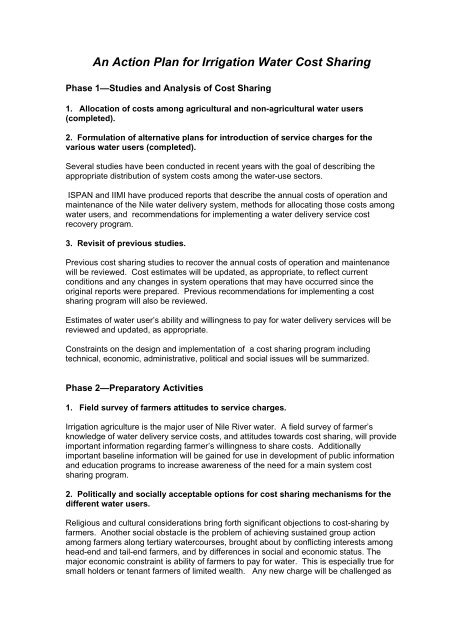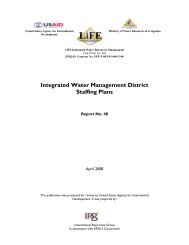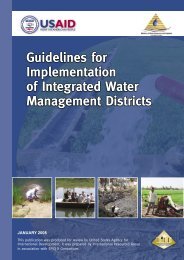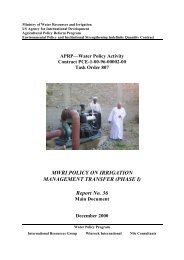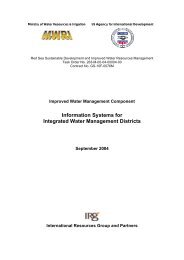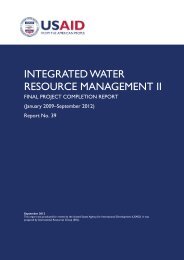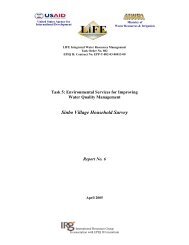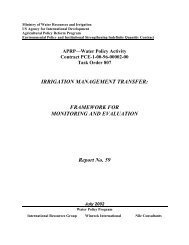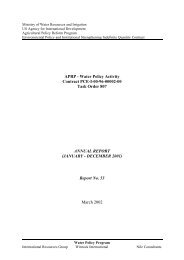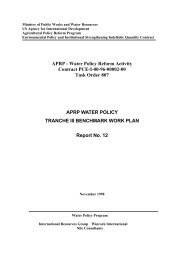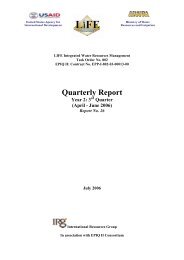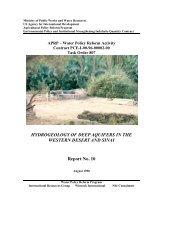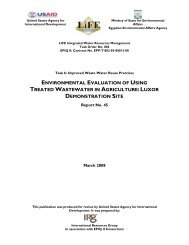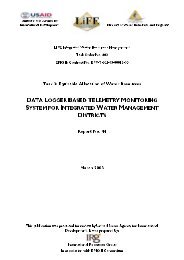APRP - Water Policy Reform - LIFE-IWRMII Project, Egypt
APRP - Water Policy Reform - LIFE-IWRMII Project, Egypt
APRP - Water Policy Reform - LIFE-IWRMII Project, Egypt
- No tags were found...
Create successful ePaper yourself
Turn your PDF publications into a flip-book with our unique Google optimized e-Paper software.
An Action Plan for Irrigation <strong>Water</strong> Cost SharingPhase 1—Studies and Analysis of Cost Sharing1. Allocation of costs among agricultural and non-agricultural water users(completed).2. Formulation of alternative plans for introduction of service charges for thevarious water users (completed).Several studies have been conducted in recent years with the goal of describing theappropriate distribution of system costs among the water-use sectors.ISPAN and IIMI have produced reports that describe the annual costs of operation andmaintenance of the Nile water delivery system, methods for allocating those costs amongwater users, and recommendations for implementing a water delivery service costrecovery program.3. Revisit of previous studies.Previous cost sharing studies to recover the annual costs of operation and maintenancewill be reviewed. Cost estimates will be updated, as appropriate, to reflect currentconditions and any changes in system operations that may have occurred since theoriginal reports were prepared. Previous recommendations for implementing a costsharing program will also be reviewed.Estimates of water user’s ability and willingness to pay for water delivery services will bereviewed and updated, as appropriate.Constraints on the design and implementation of a cost sharing program includingtechnical, economic, administrative, political and social issues will be summarized.Phase 2—Preparatory Activities1. Field survey of farmers attitudes to service charges.Irrigation agriculture is the major user of Nile River water. A field survey of farmer’sknowledge of water delivery service costs, and attitudes towards cost sharing, will provideimportant information regarding farmer’s willingness to share costs. Additionallyimportant baseline information will be gained for use in development of public informationand education programs to increase awareness of the need for a main system costsharing program.2. Politically and socially acceptable options for cost sharing mechanisms for thedifferent water users.Religious and cultural considerations bring forth significant objections to cost-sharing byfarmers. Another social obstacle is the problem of achieving sustained group actionamong farmers along tertiary watercourses, brought about by conflicting interests amonghead-end and tail-end farmers, and by differences in social and economic status. Themajor economic constraint is ability of farmers to pay for water. This is especially true forsmall holders or tenant farmers of limited wealth. Any new charge will be challenged as


